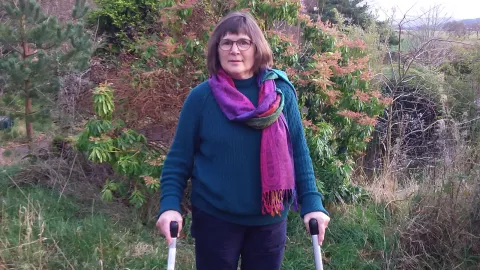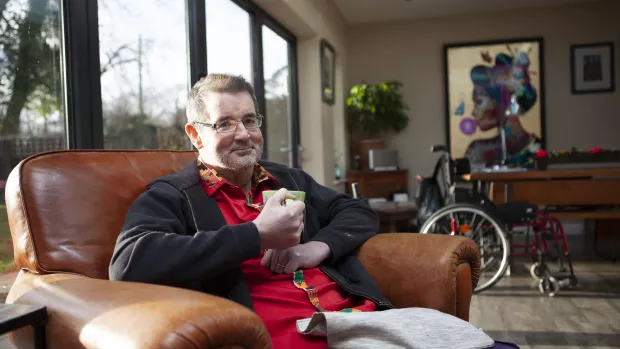
My journey from relapsing remitting to secondary progressive MS
Hello, my name is Nina Campbell. I’m 57, live in the Highlands of Scotland and have been married for 29 years to my husband Laurence. We have 3 beautiful and successful daughters and a gorgeous 1-year-old grandson.
I was diagnosed with MS in the 1990s
While I was pregnant with our second daughter in 1994 (at the age of 32), I had a fall. It resulted in temporary tunnel vision in my left eye and l also started dragging my right leg.
When she was 9 months old I realised l was still dragging my leg a bit and it was obviously not due to the pregnancy. After a discussion with my GP I was referred to hospital for tests. Following a brain scan I was admitted overnight to have a lumber puncture and further tests the next day.
It was the first time I had ever been apart from our 2 daughters and I felt wretched and very alone.
The next day my consultant said to me very bluntly: ‘oh the brain scan was conclusive enough, you have MS’. Wham, that was it, nothing else. He just said ‘you can go home now’. I walked alone to the hospital entrance, trying not to cry and get myself composed before meeting Laurence.
I was one of the first people to get an MS treatment
I subsequently had better appointments with the consultant and relapsing remitting MS was explained to me. The very first MS treatments had only just become available for relapsing MS and I started taking Betaferon a year after our third daughter was born in 1997. Being one of the first recipients of the drug was fantastic.
I injected Betaferon every other day in my tummy or bottom for 8 years. I still have scarring under the skin, especially on my tummy, as a result. I did try a different beta interferon, injected into the muscle once weekly by a nurse. But I couldn’t tolerate the side effects and it wasn't as effective for me.
I was bluntly told I had secondary progressive MS
It was after these 8 years that my consultant, very bluntly once again, said to me, ‘well Betaferon isn’t really helping you any more, you are secondary progressive MS now.’
Laurence was with me at this appointment and we were both absolutely stunned. We felt like we’d been hit in the face with a wet fish. My consultant just told me to continue looking after myself as well as l was doing - but in terms of treatment for to slow down my secondary progressive MS, nothing was available for me.
So for a long time the only drug I took was baclofen (a muscle relaxant) and I tried to keep myself as healthy and active as possible.
Read about disease modifying therapies for secondary progressive MS
I found a treatment that helps me live better with MS
In 2014 we moved from the city to the Highlands. I thought the Highlands would be far less advanced in MS care, but I was very wrong.
My new consultant was quite surprised when I met him and told him that I had secondary progressive MS, and that I believed there was no other medication available to help manage my symptoms.
He explained that I was eligible to try a drug called Fampyra (fampridine). This is a symptom management drug that has been shown to improve walking ability in some adults with MS.
I found the side effects quite horrible to start with, and had disturbed sleep and nightmares. But I persevered and as a consequence I have better mobility, feel more balanced and steady and have more energy.
Two years ago our oldest daughter got married and I went through the whole day using my 2 sticks, even managing to dance in to the evening much to my delight and amazement.
We now have a beautiful 1-year-old grandson, and although I can't run around with him and sit on the floor and play with him, (which is frustrating and upsetting), I find other ways to interact with him, which are very special and rewarding for him and me.
Read more about Famprya(fampridine)
Secondary progressive MS has been overlooked for too long
I’ve helped the MS Society campaign to stop the postcode prescribing of Fampyra and make it available to everyone who needs it.
And I’m excited to hear that more research is going on into disease modifying therapies that could slow down secondary progressive MS. I feel it has been overlooked for too long.
The more able and strong those of us with secondary progressive MS can be, the longer we can stay independent. That’s not only better for us, but better for our already stretched NHS and care services.
I’ve lived with MS for over twenty years now
I think the best advice I can give to anyone with MS, whether relapsing or progressive is to stay positive. Concentrate on the things you can do, not on the things you can’t. It is an approach which has served me well.
Disease modifying therapies (DMTs) for secondary progressive MS
Secondary progressive MS means for many people that their relapses have stopped and inflammation is no longer seen on their MRI scans.
Some people with secondary progressive MS have relapses still and scans continue to show inflammation. For these people there are two DMTs available in the UK: Extavia and siponimod (Mayzent). Siponimod was given the go-ahead this year. Both of these work by stopping the immune system attacking myelin.
Researchers are now exploring whether this approach could work for people who are no longer experiencing relapses.
Read about the ChariotMS trial to see if cladribine can slow progression in advanced progressive MS
Research is also progressing to find drugs that can protect nerves and replace myelin, which are key to slowing or stopping MS.



